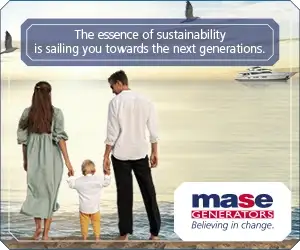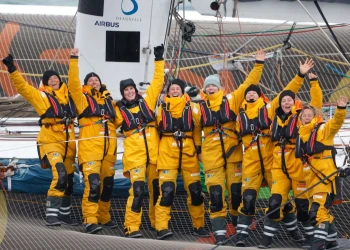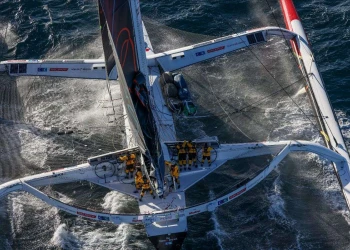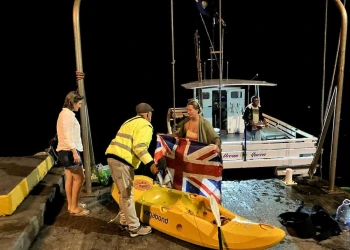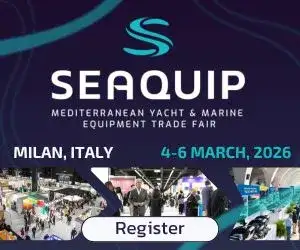
Dee Caffari Photo © Robin Aron
The Transat Paprec Dee-constructed
Britain's record breaking Dee Caffari has six circumnavigations under her belt, four of them racing. She has spent most of the last three seasons racing small raceboats two handed, first as a 'mixed double' with James Harayda – who is preparing to race the next Vendée Globe – and last year with double Olympic gold medallist Shirley Robertson they raced the 1800 mile Round Britain and Ireland race.
Caffari expressed an interest in competing on the Transat Paprec, the 'mixed doubles' Beneteau Figaro 3 event which starts this weekend from Concarneau and races to Saint Barth's, but it unfortunately could not fit her schedule this year. Nonetheless she is a fan of the Transat Paprec and sees it as a great opportunity for more women to gain experience of racing across the Atlantic on very evenly matched, high performance offshore one design.
Dee what is it that appeals most about the concept of the Transat Paprec?
"I think it is a really good idea. I think the potential that it has is to increase participation and create opportunities and access to female sailors, to have an equal role in a race like this, and all that is involved is absolutely key. We need events like this to fast track experience and increase the number of sailors with this level of experience so that they have potential to go and do other things in the future. I supported this race as soon as I heard about it. It is about increasing access it is a bold move to make it happen. The timing and the logistics are not easy though, it is expensive to ship the boat back, but for me it was on my radar and I was interested but it did not fit with my calendar this season."
There are suggestions that there is a clash with The Ocean Race that has somehow reduced the pool of 'good' women who could have been on the startline?
"In my opinion this race has not lost potential participants to The Ocean Race. What is interesting is that all the females who are participating in The Ocean Race might have been interested but whether they would have participated is really hard to say. All females who are actively offshore racing already are key people who might have been attracted, yes perhaps, but this is about widening the pool so it is not these same faces, same names doing all the events. There are new females coming into offshore racing and learning and getting this kind of experience. When people are looking for crew they will find more women who already have done a Transatlantic, that is what we want to grow."
And you like the boat, it is ideal for this type of race?
"The size of boat is perfect, they are fun. I have spent three seasons racing 30 foot boats double handed, it is fun, you are busy it is exceedingly competitive and we know how strong the Figaro class is. We know how hard it is to get the experience to break into this, it is definitely on peoples' radars now. I think people who are maybe reluctant now will put it on the radar for the future."
What is the essence of making the male-female mix work most effectively or is it just like any other partnership?
"Having had a couple of years in this set up, male-female, we never ever thought about it like that, like male-female roles. It was always about where we could play to our strengths. On boats of these size of course people could happily sail solo. It is not a case of not being able to do anything, it is a case of playing to strengths, and if somebody handles the boat better through manoeuvres while the other multitasking doing everything else. But typically with James and I he would drive and I would run round and do everything else but then we would have the ability to trust each other perfectly if the roles were reversed and you have to share that responsibility because on a long race like this you have to have perfect confidence in the other person. There is not really a strength advantage either way it is all about confidence and trust. Under pressure people will naturally gravitate to a certain role on the boat and it is important to know what that is in your set up."
There is nothing inherently different in the male-female mix to the female-female duo to the male-male duo as far as you see it?
"No. Going from racing with James to racing with Shirley it was again about complementary pairings. In both pairings I was much happier being forwards and doing the jobs and trimming when for example Shirley is a much more competent helm, so she spent most of her time steering and the roles really were complementary."
It is all about skills and strengths not gender?
"Absolutely. With James and I there was never a gender conversation at all. Maybe when it came to peeing! Otherwise it was irrelevant. And that is nice thing about sailing and this race, you are on the same boats on the same bit of ocean trying to do the same things better than everyone else, mother nature doesn't care if you are male or female and it is irrelevant, you are a pair of sailors trying to get the best performance out of your boat and what sex you are is irrelevant, what matters is your are pulling in the same direction."
There are reputedly a number of guys not doing it because they say there are not enough competitive, good girls out there? And how long do you consider it takes to train a good sailor up to a level of being complementary and competitive in this fleet?
"The reality is we are still at the stage where many guys have not tried sailing double handed with a woman and therefore really don't know. It is incredible that reaction still exists...... but we are slowly breaking down that agenda. It does not take that long to get teams up to a good level because these are small boats and there are enough people out there with experience who can help fast track the skills needed. The girls want the performance as well, they know how to get the numbers and it is a question of getting the guys comfortable with that."

